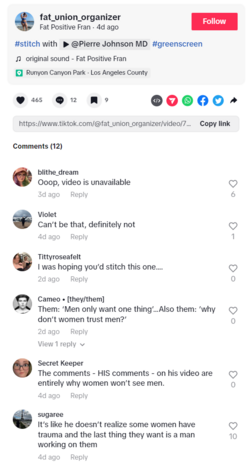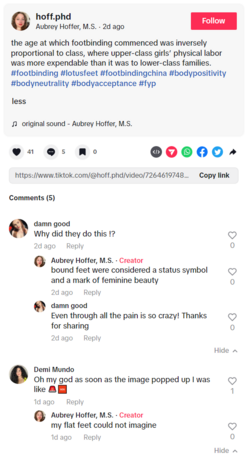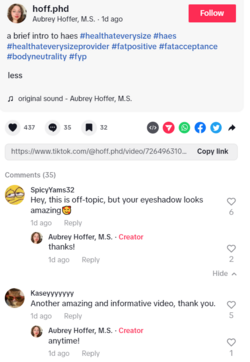- Joined
- Feb 24, 2019
Navigation
Install the app
How to install the app on iOS
Follow along with the video below to see how to install our site as a web app on your home screen.
Note: This feature may not be available in some browsers.
More options
Style variation
You are using an out of date browser. It may not display this or other websites correctly.
You should upgrade or use an alternative browser.
You should upgrade or use an alternative browser.
Fat Acceptance Movement / Fat Girlcows
- Thread starter AtroposHeart
- Start date
- Joined
- Sep 20, 2016
I haven't seen anything with her in months, so the fact she's porking back up was really obvious in this vid. So of course she doesn't want to talk about weight loss anymore, and has resorted to "I'm happy with where I'm at" copium.Fat Alex is still fat as shit and has started gaining. Blames it on "going through some stuff", snacking and comfort eating.
So happy and healthy though.
17:19
- Joined
- Feb 15, 2021
She has definitely porked up more recently. She's been slowing regaining weight for about a year now. At 12 months post-op she admitted to a 20-25lb regain after initially claiming a 100lb loss. She hasn't lost even a pound of that regain let alone plateaued at that weight like she claims. She's now 20 months post-op trying to pretend to us she's only regained 5-10lb. That's bullshit and everyone can see it on her. She is nowhere near "happy where I'm at".I haven't seen anything with her in months, so the fact she's porking back up was really obvious in this vid. So of course she doesn't want to talk about weight loss anymore, and has resorted to "I'm happy with where I'm at" copium.
The whole reason for her WLS was because she was desperate to start a family. She's been trying unsuccessfully to conceive for the past 8 months at least. She's also consulted a fertility clinic and been told she doesn't meet the BMI limits. Most fertility clinics require a BMI below 30, and she is likely still around 80-100lb away from that. I guess she doesn't want that family enough to sacrifice all those snacks she grazes on all day long. I do think she believes going to the gym counters all the crap she eats AND drinks, but she's just kidding herself. I'm expecting to see a rant video before much longer about how unfair it is, and medical discrimination, akin to the one she made when she was refused life insurance last year. I for one will be looking forward to that rant.
ETA: due to my previous employment I'm pretty good at guessing someone's weight, but filters do muddy the water, and she definitely uses filters. At 5'3"-5'4" I'd suggest she is 260-300lb so a BMI of 46 - 51. Well out of the range of IVF.
Last edited:
- Joined
- Mar 5, 2023
Interesting find I want to share:
Abstract:
The reason why I wanted to share this
Moving past the survey, onto the interviews
Quotes picked as example
This is a true genocide!
Conclusion of the study
The “difficult” cadaver: weight bias in the gross anatomy lab
Abstract:
This doesn't really tell us anything. Let's read it!Background: The prevalence of overweight and obesity continues to rise and is associated with increased morbidity and mortality. Weight bias is common among physicians and medical students and limits the therapeutic alliance between providers and patients with overweight and obesity.
Objective: The authors sought to explore the relationship between the gross anatomy course and medical student attitudes towards weight and obesity.
We are off with a good start!Physicians, like the general population, often hold negative attitudes toward those they perceive to have excess weight [1–3]. Doctors have been shown to view individuals with obesity as lazy, noncompliant, and unlikely to benefit from counseling [4–6]. They report less respect for these patients and less desire to help them, and they are more likely to view these clinical visits as a waste of time [4,5,7,8]. These attitudes constitute weight bias, defined as negative attitudes toward people based on perceptions about their weight/obesity [1–3], and adversely affect the doctor-patient relationship and the quality of patient care [7,9–12].
The reason why I wanted to share this
This is a perfect example of ideology meeting reality. The majority of those who see the reality of obesity end up regarding it as a negative thing. Who would have thunk that?In response to the statement, ‘The anatomy lab has changed how feel about people with overweight/obesity,’ 22% of respondents marked ‘yes’ (Table 2). Analysis of the 63 free text responses (completed by 85–95%) revealed that for 70% of these students, the course had generated negative feelings or attitudes toward body fat or people with overweight/obesity; for 11%, the course had generated sympathy/empathy for people with overweight/obesity or anger toward those who made negative comments about larger bodies; and the remaining 19% left neutral comments (e.g., ‘fat affects every organ system’).
Moving past the survey, onto the interviews
Three major themes emerged from the analysis: 1) Difficult Bodies; 2) Unhealthy Bodies; and 3) Disgust.
students saw the value of a body as related to the ease with which information could be extracted from it, and where students framed negative attitudes toward larger bodies as concern for the health consequences of overweight and obesity.
Quotes picked as example
Disgust: Seeing how thick and heavy the fat is has been a little eye-opening and it grosses me out to think that that is what’s inside people (Female, 2016 survey).
Difficult bodies: I can see how surgeons have difficulty operating on people with obesity (Male, 2015 survey). It has made me more worried about working with overweight/obese people because I think it will be more difficult to diagnose/complete procedures due to the excess adipose (Female, 2015 survey).
Unhealthy bodies: The first time that I saw a cadaver that was overweight it was a pretty visceral experience of like, oh, wow, I can totally understand why being overweight would be bad for your internal organs and bad for your health
This is a true genocide!
It’s helped me see some of the damage I’m doing to myself; I’m obese (Male, 2017 survey).
I have started eating healthier and exercising more because of my cadaver. (Female, 2016).
Having seen what it does to you, I will never be overweight (Male, 2018 survey).
Conclusion of the study
Our analysis of interview and survey data suggests that students perceived gross anatomy as influencing their feelings and attitudes about fat through a complex process wherein academic pressure and classroom commentary that cast adipose tissue as ‘disgusting’ and dissecting larger bodies as ‘difficult’ amplified their pre-existing weight biases and body image issues.
[...] Yet students in this study did not view these technical difficulties as either educational or emotionally or morally neutral: instead, they frequently described dissecting larger bodies as less educational, requiring extra work, and a waste of time. This observation – that students saw ‘difficult’ bodies as less educationally valuable – is concerning,[...]
Additionally, our results suggest a potential opportunity to use positive role-modeling to address weight bias. How instructors use the word ‘difficult’ merits particular attention, as there is evidence that the ‘difficult patient’ framework is counterproductive for reducing weight bias [32].
Last edited:
- Joined
- Aug 28, 2019
More Brye music:

Why must they hate on gym bros? Such discrimination.

Only three people who aren't her have used the sound so far. One of them is Jordan.
Fran provides educational content

Seems kinda terfy, Fran.
Aubrey has some updates for us

I too have read The Good Earth.


Why must they hate on gym bros? Such discrimination.

Only three people who aren't her have used the sound so far. One of them is Jordan.
Fran provides educational content

Seems kinda terfy, Fran.
Aubrey has some updates for us

I too have read The Good Earth.

Attachments
Dnein
kiwifarms.net
- Joined
- Jul 18, 2021
The cadaver paper is spot on. Up at 3am cleaning tissue to even make the muscles visible, scraping away oily ricotta, knowing the other cadaver of normal size took 15 minutes to show the relevant tissue. We had to prep a limited number for students, and knowing some classes would see muscular less clearly because it's impossible to entirely reveal it under all that sticky mass sucks. Your sleeves are soaked in oily, formaldehyde smelling yellow, your gloves are covered in sticky lumps, tools are difficult and cleaning is a nightmare. Opening up to see surgery after surgery that struggled to keep the person alive, replaced joints, missing parts, organs literally packed in fat you can hardly imagine functioning. It's all abstract before that.
It's not academic pressure or classroom commentary making them feel disgusted, it's their eyes seeing disgusting shit that's making them feel disgusted. They are literally seeing for themselves what excess fat does to the body. Yet these authors still manage to make the "society" argument about why no one likes fat bodies.students perceived gross anatomy as influencing their feelings and attitudes about fat through a complex process wherein academic pressure and classroom commentary that cast adipose tissue as ‘disgusting’
Wallace
kiwifarms.net
- Joined
- Jun 23, 2015
Broke: Taking inventory and ownership of your own life and making amends to better yourself.It's not academic pressure or classroom commentary making them feel disgusted, it's their eyes seeing disgusting shit that's making them feel disgusted. They are literally seeing for themselves what excess fat does to the body. Yet these authors still manage to make the "society" argument about why no one likes fat bodies.
Woke: Taking inventory of other people's lives and demanding that they make amends to you.
Bespoke: Taking inventory of other people's lives and making passive-aggressive appeals to a third party to pressure them into making amends for you.
Last edited:
- Joined
- Mar 5, 2023
Yet what the authors want the students to understand is... all of this is not true? That fat is amazing? I am not quite sure. They seem to implicitly push the idea that all health issues related to being obese are due to stigma and poor doctor-patient relations, and not to actual physical/mechanical limitations of being fat.The cadaver paper is spot on. Up at 3am cleaning tissue to even make the muscles visible, scraping away oily ricotta, knowing the other cadaver of normal size took 15 minutes to show the relevant tissue. We had to prep a limited number for students, and knowing some classes would see muscular less clearly because it's impossible to entirely reveal it under all that sticky mass sucks. Your sleeves are soaked in oily, formaldehyde smelling yellow, your gloves are covered in sticky lumps, tools are difficult and cleaning is a nightmare. Opening up to see surgery after surgery that struggled to keep the person alive, replaced joints, missing parts, organs literally packed in fat you can hardly imagine functioning. It's all abstract before that.
The authors got lost in their own argument. The HAES ideology is not too overt, but they still draw some crazy conclusions. They just chalk it up to "stigma", when all I see is "reality" and "opinions that are not 'nice' or PC".Yet these authors still manage to make the "society" argument about why no one likes fat bodies.
What are the TAs and professors supposed to say? "Oh great, fat bodies are exactly the same as skinny bodies"? To me it seems it is objectively harder to deal with a fat cadaver, why should I not be able to classify those bodies as "difficult" then? Why does their offense at reality mean that we should start collectively lying?
- Joined
- Feb 24, 2019
Crepidodera fulvicornis
She's exactly like a watermelon, big and round
True & Honest Fan
kiwifarms.net
- Joined
- Mar 2, 2021
On a bright sight, munchies found their miracle drug.
- Joined
- Feb 24, 2019
Crepidodera fulvicornis
She's exactly like a watermelon, big and round
True & Honest Fan
kiwifarms.net
- Joined
- Mar 2, 2021
Does she mean Covid provoked T1D debut? And she doesn’t change her diet?Evie is now stating she got diabetes due to getting covid. She states that shes doing good though that as long as her numbers are within 50 to 100 points of her normal 100 TO 200 points it is fine. She admits she refuses to give up sweets.
View attachment 5265468View attachment 5265485View attachment 5265486View attachment 5265498
View attachment 5265467View attachment 5265470View attachment 5265472View attachment 5265477View attachment 5265479View attachment 5265483View attachment 5265484
Or did Covid provoked T2D (that makes less sense but ianad)
- Joined
- Feb 24, 2019
Type 2 the drug she mentions is specifically for T2D.Does she mean Covid provoked T1D debut? And she doesn’t change her diet?
Or did Covid provoked T2D (that makes less sense but ianad)
Crepidodera fulvicornis
She's exactly like a watermelon, big and round
True & Honest Fan
kiwifarms.net
- Joined
- Mar 2, 2021
Sooo, how Covid could influence T2D? Could it or does she she lie because fatties lie?Type 2 the drug she mentions is specifically for T2D.
- Joined
- Feb 24, 2019
None that it causes it. But it will make it worse for them and make the covid worse.Sooo, how Covid could influence T2D? Could it or does she she lie because fatties lie?
- Joined
- Sep 28, 2022
I would bet she is lying. There has been no instances that I have heard of about covid causing T2. Its a fucking cold virus. Its more likely her lazing around and aging during covid lockdowns caused weight gain which caused the beetus.Sooo, how Covid could influence T2D? Could it or does she she lie because fatties lie?
Crepidodera fulvicornis
She's exactly like a watermelon, big and round
True & Honest Fan
kiwifarms.net
- Joined
- Mar 2, 2021
When I mentioned I’d believe in T1 I didn’t mean Covid could cause it, more like provoke (wrong word perhaps, stay with me here), like autoimmune diseases tend to debut after some stress and Covid very well could be such stress for organism.I would bet she is lying. There has been no instances that I have heard of about covid causing T2. Its a fucking cold virus. Its more likely her lazing around and aging during covid lockdowns caused weight gain which caused the beetus.
But T2 though — doubt
- Joined
- Sep 28, 2022
exactly, T1 is a autoimmune disorder but T2 has not yet been proven to be autoimmune. So really its just causeWhen I mentioned I’d believe in T1 I didn’t mean Covid could cause it, more like provoke (wrong word perhaps, stay with me here), like autoimmune diseases tend to debut after some stress and Covid very well could be such stress for organism.
But T2 though — doubt
F A T
- Joined
- Oct 11, 2018
Oh come now, Covid DEFINITELY caused T2 diabetes in people who never had it before. Just like it caused cancer, leprosy and tooth decay. It couldn't be that those ailments could've been caused by smoking, licking armadillos and not brushing teeth. It's always Covid. It's the catch-all for avoiding responsibility.
If mental gymnastics burned calories like actual movement, every one of these delightful twatwaffles would rival Ashley Issacs for skinny-lich-queen.
If mental gymnastics burned calories like actual movement, every one of these delightful twatwaffles would rival Ashley Issacs for skinny-lich-queen.










